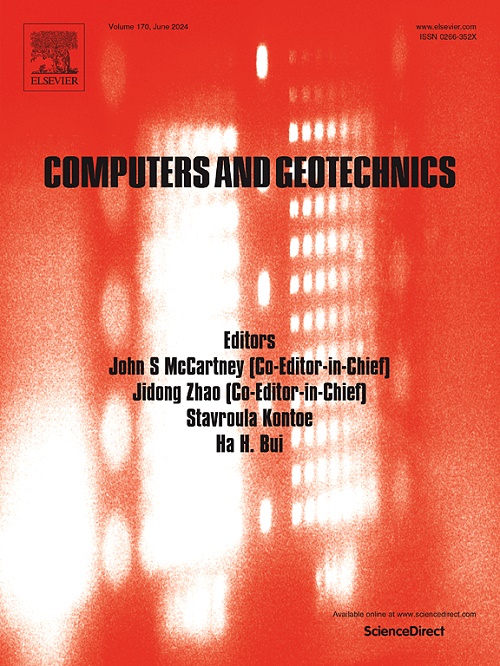Analytical solution for radial consolidation of combined electroosmosis-vacuum-surcharge preloading considering free strain and cyclic loading
IF 5.3
1区 工程技术
Q1 COMPUTER SCIENCE, INTERDISCIPLINARY APPLICATIONS
引用次数: 0
Abstract
In this study, electro-osmotic consolidation considering smear effect and free strain under cyclic loading was investigated. The analytical solution of radial consolidation of electroosmosis-vacuum-surcharge combined preloading is derived by using the Bessel function and eigenfunction methods. Subsequently, the effectiveness of the proposed method is validated through comparison with existing numerical solutions. Based on the derived solutions, the influence of the smear effect, applied voltage, vacuum pressure, and cyclic loading on soil consolidation characteristics was analyzed. The results showed that the smearing effect slows the rate of consolidation, but the final average consolidation and negative excess pore water pressure are enhanced. Compared with only cyclic loading, the combined effect of electroosmosis, vacuum, and surcharge preloading enables the soil to achieve higher strength and consolidation. When the effect of electroosmosis alone on reinforcing low-permeability soils is not significant, the combination of electroosmosis with vacuum preloading helps enhance the soil reinforcement effect.
考虑自由应变和循环加载的电渗-真空-加载组合预加载径向固结的分析解决方案
本研究对循环加载下考虑涂抹效应和自由应变的电渗固结进行了研究。利用贝塞尔函数和特征函数方法推导出了电渗-真空-加载组合预加载径向固结的解析解。随后,通过与现有数值解的比较,验证了所提方法的有效性。根据推导出的解决方案,分析了涂抹效应、外加电压、真空压力和循环加载对土壤固结特性的影响。结果表明,涂抹效应减缓了固结速度,但最终平均固结度和负过剩孔隙水压力得到了提高。与只进行循环加载相比,电渗、真空和附加物预加载的综合效应可使土壤获得更高的强度和固结度。当单独使用电渗加固低渗透性土壤的效果不明显时,将电渗与真空预加载相结合有助于提高土壤加固效果。
本文章由计算机程序翻译,如有差异,请以英文原文为准。
求助全文
约1分钟内获得全文
求助全文
来源期刊

Computers and Geotechnics
地学-地球科学综合
CiteScore
9.10
自引率
15.10%
发文量
438
审稿时长
45 days
期刊介绍:
The use of computers is firmly established in geotechnical engineering and continues to grow rapidly in both engineering practice and academe. The development of advanced numerical techniques and constitutive modeling, in conjunction with rapid developments in computer hardware, enables problems to be tackled that were unthinkable even a few years ago. Computers and Geotechnics provides an up-to-date reference for engineers and researchers engaged in computer aided analysis and research in geotechnical engineering. The journal is intended for an expeditious dissemination of advanced computer applications across a broad range of geotechnical topics. Contributions on advances in numerical algorithms, computer implementation of new constitutive models and probabilistic methods are especially encouraged.
 求助内容:
求助内容: 应助结果提醒方式:
应助结果提醒方式:


